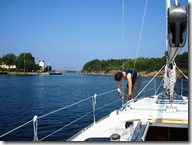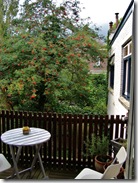 Sailing out of season
Sailing out of season
Hallways after the Social Plan 
and, in summertime, on blogs authored by the Dutch…
‘hope everyone is having fun vacations!
Random Walks in the Low Countries
Reflections and observations on the expatriate experience from an American scientist living and working in the Netherlands.
by Dave Hampton
by Dave Hampton
The Dutch seem to be headed to the US this summer. I suspect that it’s driven by some combination of a strong euro and (relatively) cheap US gas, perhaps even by renewed interest in the US presidential race or bad weather here.
Whatever the reason, I’ve shared a bunch of evenings pouring over maps with friends, pointing out stops and handing out AAA guidebooks. I’ve driven the entire country except for Oklahoma, and the conversations have reminded me of so many of the places I’ve loved visiting over the years. So, I’ll take this evening to share a few: I’m happy to send along more guidance for any of them if you are thinking about a visit.






I spin the map scanning states and tracing highways, and there are still lots that I could suggest: short stretches through Arkansas or Colorado, a favored bit of southern Wisconsin or northern Minnesota, a memory between Las Vegas and the Grand Canyon. These are the ones that jumped out though…’makes me want to start a vacation tomorrow…
by Dave Hampton
Former US Senator Jesse Helms died this month. He was an arch-conservative senator representing North Carolina, and was the most vocal critic of progressive social causes in the Senate. His opinions were often bigoted, his inflexibility was infuriating, his campaigns were a model for everything that is wrong with American politics. I can’t imagine anyone who embodied the pole of the political spectrum most distant from me.
Still, I appreciated having his voice (if not his style) in the public discourse.
Governmental policy should always be based on accurate understanding and fair solutions. Accurate understanding, knowledge, doesn’t rest simply on data, but also on how that data is interpreted. Assumptions and context must also be considered. Fair solutions are arrived at when a plurality of voices craft a policy. The process gives each side a chance to take a stand, present their evidence, and participate in finding a solution.
The Bush administration’s insistence on internal secrecy and suppression of dissenting voices run wholly counter to these principals, and have resulted in terrible public policy. They may be expedient, but they have failed to grasp essential facts or to enlist wide support. In turn, the Congress, the press, and the public failed to defend an opinion or to demand a voice alongside this Administration. When each looks back and tries to draw their lessons, I hope that it will be to press for greater transparency and inclusion, not further partisan exclusion.
Jesse Helm’s obituary reminds me of how much I disagreed with his stands over the years. But it also reminds me that his arguments forced balance into my stances and compassion into the policies that I advocated. And, appropriately embraced, that is one of the true advantages of governing by representative democracy.
by Dave Hampton
 I’ve looked forward to this weekend for a while: I haven’t had an uncommitted weekend in two months. This one is completely free: I plan to ‘catch up, ‘do nothing, and ‘do something (not in equal proportion). For a further change of pace, I’m largely avoiding job hunting, data analysis, computer surfing, and podcasts.
I’ve looked forward to this weekend for a while: I haven’t had an uncommitted weekend in two months. This one is completely free: I plan to ‘catch up, ‘do nothing, and ‘do something (not in equal proportion). For a further change of pace, I’m largely avoiding job hunting, data analysis, computer surfing, and podcasts.
Bliss.
So, I’ve done a bit of watering, shopping, filing, and exercising to satisfy the first…took a walk and watched a ‘guilty pleasure’ movie for the second…started reading a Philip Roth novel (my first) for the third. It’s a lazy day: storms blowing through but no interruptions or demands. It’s almost as good as long walks in high open spaces, especially with a stiff wind vibrating in the trees.
The Dutch headed out en masse this weekend: the Gelderlander reports traffic jams leading south and east, with hours of delays at the Swiss passes. Although my daily commute will be easier, I’m happy that people still fill the neighborhood square.
It’s a nice feeling to see everyone walking and biking around the stores. I never see that in the US any more: the pace, scale, and human-ness of it all has become comfortable and familiar.
My biggest issue this election is restoring civil liberties: those freedoms that protect the individual from the government. These liberties first appeared in the Magna Carta and are guaranteed by the US constitution. They include freedom of speech, association and assembly, the of the press and religion, equal protection under the law and rights to due process, and freedom from unwarranted government intrusion into your personal and private affairs.
Traveling, banking, and communicating across the US border has made me very aware of how much these rights have eroded since 9/11, many current abuses having no connection to combating terrorism.
I was wondering whether "freedom of speech’ includes a right to remain silent? is it legal in the US for the government to require loyalty oaths, for example. It’s not an academic question: the Republican National Committee (RNC) used both signed Loyalty Oaths and spoken Loyalty Pledges as a requirement to attend 2004 re-election campaign speeches.
Standing in airport screening lines, doffing clothes and unpacking carry-ons, I wonder where my limit is. I’m inconvenienced by the procedures, but don’t object. I am uncomfortable with sniffer dogs and CCTV cameras, but don’t object. I object to surveillance of my library borrowing and electronic communications, but can’t avoid what I never see. I think I did take a loyalty oath to get my passport. What would it take for me to say ‘enough’?
Time to cook some dinner and go back to my book…’can’t let George Bush steal my Saturday. At least I’m not pummeled by the right-wing radio-screamers here in the Netherlands.
by Dave Hampton
 I’ve grown used to living with long-distance social interactions as an expatriate, with co-workers and extended family living thousands of miles away and many hours delayed. While this separation sometimes makes it difficult to understand events, I still feel like I usually know what’s happening since I can infer the likely causes.
I’ve grown used to living with long-distance social interactions as an expatriate, with co-workers and extended family living thousands of miles away and many hours delayed. While this separation sometimes makes it difficult to understand events, I still feel like I usually know what’s happening since I can infer the likely causes.
So, for example, I’ve talked with colleagues about what positions might be available at one of our US centers. They tell me that nothing is available now, but that they’ll surely open a suitable position next fiscal year. I know that budgets are, indeed, tight, so I look for a way to wait until the job becomes funded.
Yesterday, I read an article about the Gettier Problem, a philosophical challenge that asks when, in fact, we can say that we “know” something. An illustrative example is:
I’m worried that my car is safe one night, so I go outside to look at it. Unfortunately, I get turned around in the dark and go the wrong direction up my street, where I see a car that looks like mine, safe. Meanwhile, my car is, in fact, parked safely down the street.
Do I “know” that my car is safe, and am I justified in sleeping peacefully?
Classically, philosophers would say ‘yes’. Their reasoning rests on three facts: My car is safe, I believe it is safe, and I have evidence to justify my belief. (Their technical term for this argument is Knowledge through Justified True Belief, and it’s considered a basic test for whether what we think we know is, in fact, true).
Still, if I am right for utterly wrong reasons, I have to admit that I don’t really know the situation.
And that puts a creeping doubt into my smug self-assurance about inferring causes for distant events.
Its true that a vacancy will open next year, I believe my friends when they tell me that, and I justify it as a budget issue. But if management opens the vacancy on the basis of finding an attractive new project rather than making a further budget allocation in an existing project, then my chances of landing the position are significantly diminished.
Arriving at the right answer for wrong reasons is a brittle basis for taking action. I end up watching the wrong indicators and talking to the wrong people because I make wrong assumptions. Even though I’m right in the end, I’m wrong on particulars.
So, while it’s important to get the facts right, its also important to understand and to verify the reasons for believing them. Particularly in distant interactions where a lot goes unsaid and my mind is good at filling gaps with inferences, I need to stop and check the assumptions before planning actions.
Drawing credit: Jared Byer
by Dave Hampton
 Job hunting is a sure route to self-discovery.
Job hunting is a sure route to self-discovery.
I’ve been updating my resume and preparing for interviews, sending inquiries and following up on referrals. At each step, I have to think about fundamental questions of who I am, what my experience means, and what I want. The answers have to be written down in very clear and succinct prose, maybe two paragraphs that a busy person will take time to read before skimming onward. I work with a freelance writer, Judy Friedler, to organize my career into polished, formatted prose, but it still takes me weeks to arrive at satisfactory answers to her background questions, summarizing my life, my experiences, my goals.
I’ve spent lots of travel time reflecting on this, concluding that these questions actually touch on two distinct aspects of my personal identity: “Who I Am”, and “What I’ve Done”. One is a snapshot, the other a story; one constant, the other evolving. ‘I’ am not either/or: I’ve found that I need to think hard about both to describe the whole.
“Who I am” is a description, a “brand”: the unique and distinguishing qualities that make me recognizable. I am a scientist, businessman, parent, writer: but what do those words mean, how do they define me, which are important? I have academic degrees, political views, professional networks, global perspectives: which are relevant and which are toxic parts of my introduction? (The dilemma reminds of the HSBC ads that line the walls at Heathrow.)
“What I’ve done” is a narrative: the arrangement of events that tell a meaningful story about myself. I’ve held positions of increasing responsibility, I’ve learned from my mistakes, my interests have evolved, I’ve grown from knowing insightful people. The story steps and flows: what happened at each phase of my life, and how did it inspire the next transition? Does it culminate in who I am, or does it lead towards (or away from) who I want to become?
It’s been good for me to take the time to pause and do the critical assessment. It’s helped to get feedback from others during conversations and interviews, asking questions and reacting to answers. I’m surprised at how the image of “scientist” quickly locks people away from seeing “businessman”, for example, but if I juxtapose “entrepreneur” then the right image forms. The meaning (or value) of being “expatriate”, though, is still difficult for me to convey. Despite all the talk about the importance of global markets and workplace diversity, people don’t relate my experiences to those concepts easily.
And, at the end, both brand and narrative feel like they are being tailored to the simple end of job hunting. Experiences (and skills?) raising a family, pursuing life’s passions, sharing formative journeys with friends, all get omitted. A pity: a lot of that is what makes me whole, and are among life’s tales that I would share with a new friend over a good meal.
I think that the duality of brand and narrative has much more generality that just the application to identity that I’ve described here. For example, ‘returning to the topic of a web presence, I think that these concepts apply in creating an outward expression of ourselves on the Internet.
Static content, brands, occupy my personal web page, my photo site, and my social networking descriptions. They are authored, published, indexed, and made discoverable. They are intended to have longevity, and I change them infrequently.
Dynamic content, narrative, fills my publications, my blog, my status messages. These are epiphanies, posted, tagged, and streamed. They are transient and meant to be ephemeral.
Web services still don’t properly differentiate between the two. For example, Facebook narratives have a way of leaking out to become lasting images, discoverable for interviews. They should have less persistance, consistent with the style of their creation.
For building and maintaining my web presence, I’m realizing that it’s more than just ‘managing search results’. I really have to to think the content through, properly utilizing networking tools in ways that correctly catagorize and reinforce the two aspects of my personal identity.
I think that it also has big implications for how to configure medical telemonitoring, a topic that I’m thinking deeply about for an upcoming talk.
But that, as they say, will be a tale for another day (Specifically, Computers in Cardiology 2008; the Sunday Workshop).
Figurative Painting: “A Sense of Equilibrium” David Cobley
